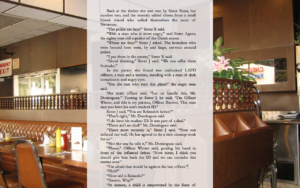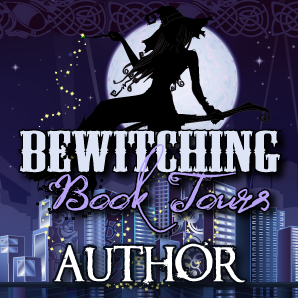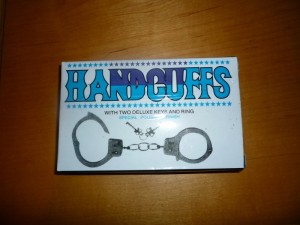by James Scott Bell
@jamesscottbell
 First off, thank you for all your wonderful support for the launch of my new thriller, Your Son Is Alive. The print version is now available.
First off, thank you for all your wonderful support for the launch of my new thriller, Your Son Is Alive. The print version is now available.
Launch week is usually a high for an author, though nerves can be set a-jangling as we wonder what the reception will be.
Which brings up the subject of the roller-coaster ride that is the writing life. For as we all know there are ups and downs and curves and twists. Sometimes it’s exciting. Other times you get queasy. Which is why you should never launch a book after a big Italian dinner.
Ahem.
We all know this gig is rife with opportunities for that devil disappointment. Our human condition can’t avoid it. We construct hopes for ourselves and our work knowing there are plenty of rocks and boulders ahead in the rushing waters of the marketplace.
This is not just in our professional lives, of course. It’s there in every other aspect of our existence on this good Earth. We are hopeful beings, we strive and and work and desire. Sometimes those things turn out exactly as we envisioned. Most of the time not so much.
I remember when my son began playing baseball. He developed into a pretty good pitcher at a young age, and there was one game where he gave up a home run that lost the game. It crushed him. As the other team was running onto the field cheering, he was standing on the mound trying not to cry.
I went out to the mound and put my arm around him and bucked him up as best I could. Then later, over ice cream, I tried to impart a little bit of stoic wisdom. “Most of life is about losing,” I said. “It’s how we handle the losses that make us or break us.”
I told him that in moments like this, when a home run is given up or such like, I would allow him one great big DANG IT! He could pound his glove as hard as he could. He could feel it for a moment, he could shout, “Dang it!” But after that he was to begin the task of forgetting it and getting ready for the next batter or the next game.
It’s a lesson he learned well. He went on to become one of the best pitchers in the league. During the season he had a bad inning against the strongest team. It was brutal. And they let him know it, the way little boys do. They jeered and threw shade. He pounded his glove as the coach relieved him.
Then came the championship game, and he faced that same team. As he stood on the mound they began to jeer again and try to rattle him. He proceeded to mow them down. And his team won the championship.
I consider that one of the best moments of both our lives.
This is how we should handle disappointment in our writing life. Our book goes out there and doesn’t perform as well as we would like. Or we get a scathing review. Or a rejection from an editor. Or Aunt Hildegard says, “When are you going to grow up and go to dental school?”
Give yourself a great big DANG IT! Pound your glove (but do not kick the dog). Then get back to your keyboard. One of the great truths about writing is that when we are in “the zone,” disappointments melt away. When we come out of the zone, the harshness may try to revisit, but it won’t be as strong. Lather, rinse, repeat.
Let me offer three more bits of stoic wisdom:
- Don’t compare yourself to others
Comedian Tom Shillue has a great five-minute video on the perils of comparison. Here is part of what he says:
If my happiness were based on being the biggest comedian in the business, I’d be mad at whoever was getting more Netflix specials than me. (I have zero.)
If it were based on having the best TV ratings, I’d be mad at Jimmy Fallon. He beats me every night.
And if it were based on being rich, I’d be mad at a lot of people.
And even if I were rich – really rich, like #10 on the Forbes 400 rich – I’d be mad that there were nine other people richer than me. It never ends.
Comparing yourself to others creates a totally unrealistic measure for what constitutes success. And I know, because the entertainment business is all about unrealistic expectations.
He concludes: “Professional success is about making a living, pursuing excellence, and finding meaning in what you do.” (You might also be interested in this video by the redoubtable Joanna Penn on the dangers of comparing yourself to other writers … and how to get over it.)
- Keep expectations in check
While it’s good to set goals, make plans, and take action, watch out for letting expectations build up too much in your mind. We have this wisdom not only from ancient philosophy; there’s also recent data that suggests lowering expectations leads to greater happiness.
For example, if you get nominated for an award, don’t keep picturing your acceptance speech. Don’t dust the mantel twice a day. When you get to the banquet, sit at the table and be a good conversationalist. Try to enjoy the rubber chicken. Then, if your name is called, it’s a bonus. If it’s not, you won’t want to crawl under the table with a bottle of wine (or whine, as the case may be).
As the great John Wooden used to tell his players, “All of life is peaks and valleys. Don’t let the peaks get too high and the valleys too low.”
- Worry only about the page in front of you
Epictetus said, “There is only one way to happiness and that is to cease worrying about things which are beyond the power of our will.”
You can’t control the will of agents, editors, critics, readers, awards committees or the IRS. So don’t worry about them. Instead, focus on your daily work. Get into your scene. Think about ways to make it better. That’s what you can control.
The mental aspect of writing is every bit as important as the physical act of typing. Which is why I wrote a whole book on the subject.
Friends, when you’re hit with disappointment, or on the other end with a great reward, remember the Latin phrase (which I had the audacity to make up):
Carpe Typem!
Seize the Keyboard!
What is your go-to method for handling the highs and lows of the writing life?










